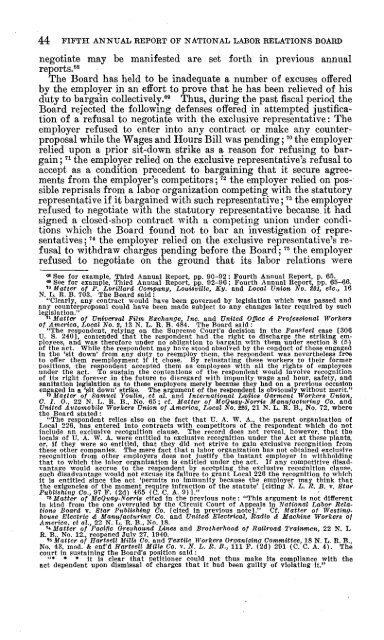NATIONAL LAB RELATIONS BOARD - National Labor Relations ...
NATIONAL LAB RELATIONS BOARD - National Labor Relations ...
NATIONAL LAB RELATIONS BOARD - National Labor Relations ...
Create successful ePaper yourself
Turn your PDF publications into a flip-book with our unique Google optimized e-Paper software.
44 FIFTH ANNUAL REPORT OF <strong>NATIONAL</strong> <strong>LAB</strong>OR <strong>RELATIONS</strong> <strong>BOARD</strong>negotiate may be manifested are set forth in previous annualreports."The Board has held to be inadequate a number of excuses offeredby the employer in an effort to prove that he has been relieved of hisduty to bargain collectively." Thus, during the past fiscal period theBoard rejected the following defenses offered in attempted justificationof a refusal to negotiate with the exclusive representative : Theemployer refused to enter into any contract or make any counterproposalwhile the Wages and Hours Bill was pending ; T° the employerrelied upon a prior sit-down strike as a reason for refusing to bargain;71 the employer relied on the exclusive representative's refusal toaccept as a condition precedent to bargaining that it secure agreementsfrom the employer's competitors; 72 the employer relied on possiblereprisals from a labor organization competing with the statutoryrepresentative if it bargained with such representative ; 73 the employerrefused to negotiate with the statutory representative because it hadsigned a closed-shop contract with a competing union under conditionswhich the Board found not to bar an investigation of representatives;74 the employer relied on the exclusive representative's refusalto withdraw charges pending before the Board; 75 the employerrefused to negotiate on the ground that its labor relations were(I8 See for example, Third Annual Report, pp. 90-92; Fourth Annual Report, p. 65.ea See for example, Third Annual Report, pp. 92-96; Fourth Annual Report, pp. 65-66.TOmatter of P. Lorillard Company, Louisville, Ky. and Local Union No. 201, etc., 16N. L. R. B. 703. The Board said :"Clearly, any contract would have been governed by legislation which was passed andany counterproposal could have been made subject to any changes later required by suchlegislation."/1 Matter of Universal Film Exchange, Inc. and United Office & Professional Workersof America, Local No. 2, 13 N. L. R. B. 484. The Board said :"The respondent, relying on the Supreme Court's decision in the Fansteel case [306U. S. 240], contended that the respondent had the right to discharge the striking employees,and was therefore under no obligation to bargain with them under section 8 (5)of the act. While the respondent may have stood absolved by the conduct of those engagedin the 'sit down' from any duty to reemploy them, the respondent was nevertheless freeto offer them reemployment if it chose. By reinstating these workers to their formerpositions, the respondent accepted them as employees with all the rights of employeesunder the act. To sustain the contentions of the respondent would involve recognitionof its right forever in the future to disregard with impunity wage and hour, safety, andsanitation legislation as to these employees merely because they had on a previous occasionengaged in a 'sit down' strike. The argument of the respondent is obviously without merit."Matter of Samuel You/in, et al. and International Ladies Garment Workers Union,0. I. 0., 22 N. L. R. B., No. 65; cf. Matter of Mc Quay-Norris Manufacturing Co. andUnited Automobile Workers Union of America, Local No. 226, 21 N. L. R. B., No. 72, wherethe Board stated :"The respondent relies also on the fact that U. A. W. A. the parent organization ofLocal 226, has entered into contracts with competitors of the respondent which do notinclude an exclusive recognition clause. The record does not reveal, however, that thelocals of U. A. W. A. were entitled to exclusive recognition under the Act at these plants,or, if they were so entitled, that they did not strive to gain exclusive recognition fromthese other companies. The mere fact that a labor organization has not obtained exclusiverecognition from other employers does not justify the instant employer in withholdingthat to which the labor organization is entitled under the act. If any competitive disadvantagewould accrue to the respondent by accepting the exclusive recognition clause,such disadvantage would not excuse its failure to grant Local 226 the recognition to whichit is entitled since the act 'permits no immunity because the employer may think thatthe exigencies of the moment require infraction of the statute' [citing N. L. R. B. v. StarPublishing Co., 97 F. (2d) 465 (C C. A. 9)1."IT Matter of MeQuay-Norris cited ' In the previous note : "This argument is not differentIn kind from the one overruled by the Circuit Court of Appeals In <strong>National</strong> <strong>Labor</strong> <strong>Relations</strong>Board v. Star Publishing Co. [cited in previous note]." Cf. Matter of Westingd Manufacturing Co. and United Electrical, Radio & Machine Workers of-house ElectricAmerica, et al. 22 N. L. R. B., No. 18.74 matter of 'Pacific Greyhound Lines and Brotherhood of Railroad Trainmen, 22 N. LR. B.. No. 12., reopened July 27, 1940.Ti Matter of Hartsell Mills Co. and Textile Workers Organizing Committee, 18 N. L. R. B.,No. 43, mod. & enf'd Hartsell Mills Co. v. N. L. R. B., 111 F. (26) 291 (C. C. A. 4). Thecourt in sustaining the Board's position said"* • * it is clear that petitioner could not thus make its compliance with theact dependent upon dismissal of charges that it had been guilty of violating it."
















